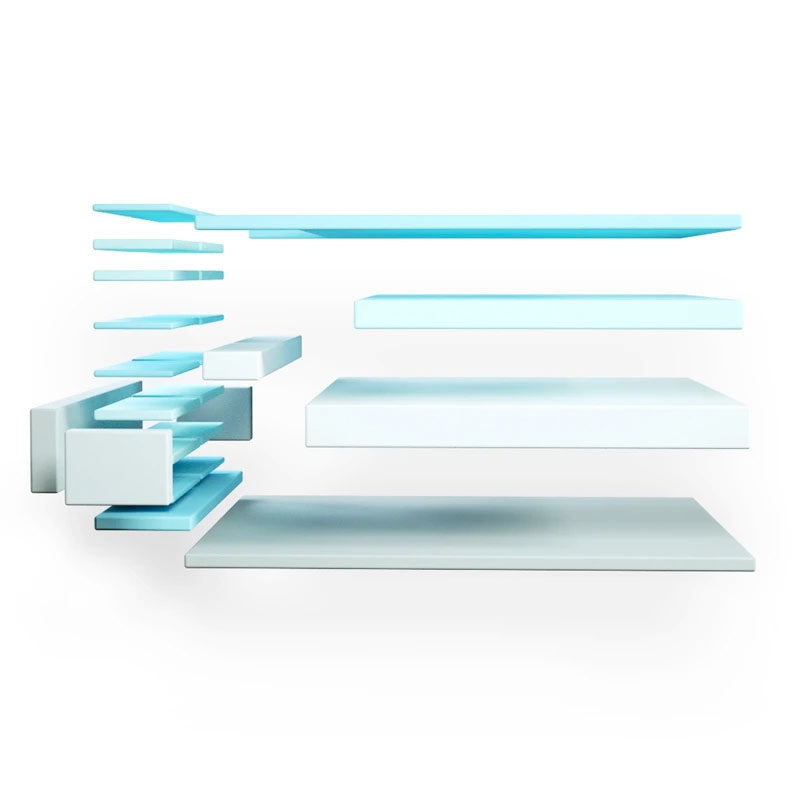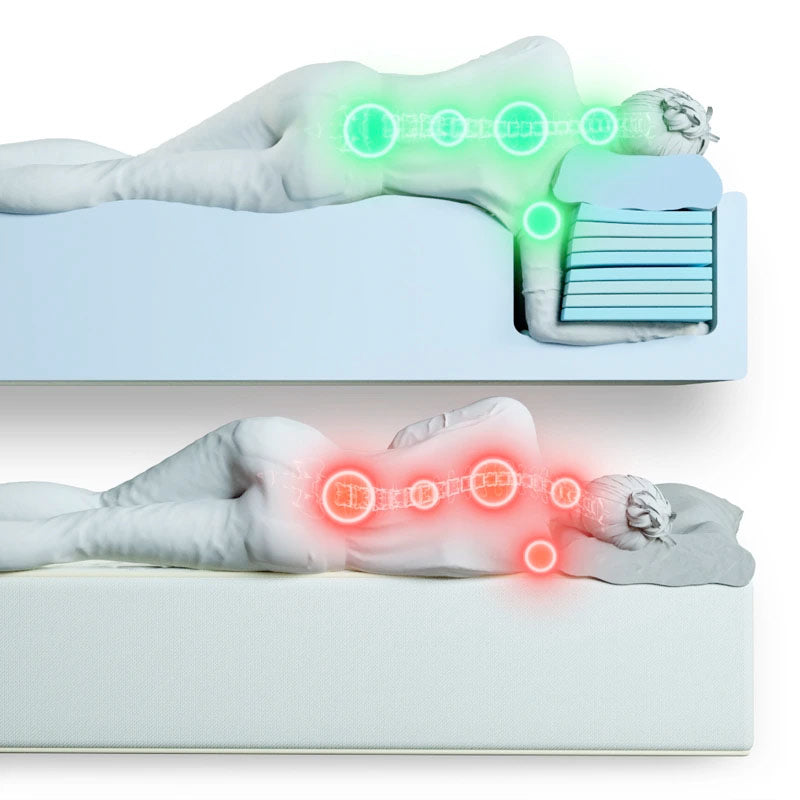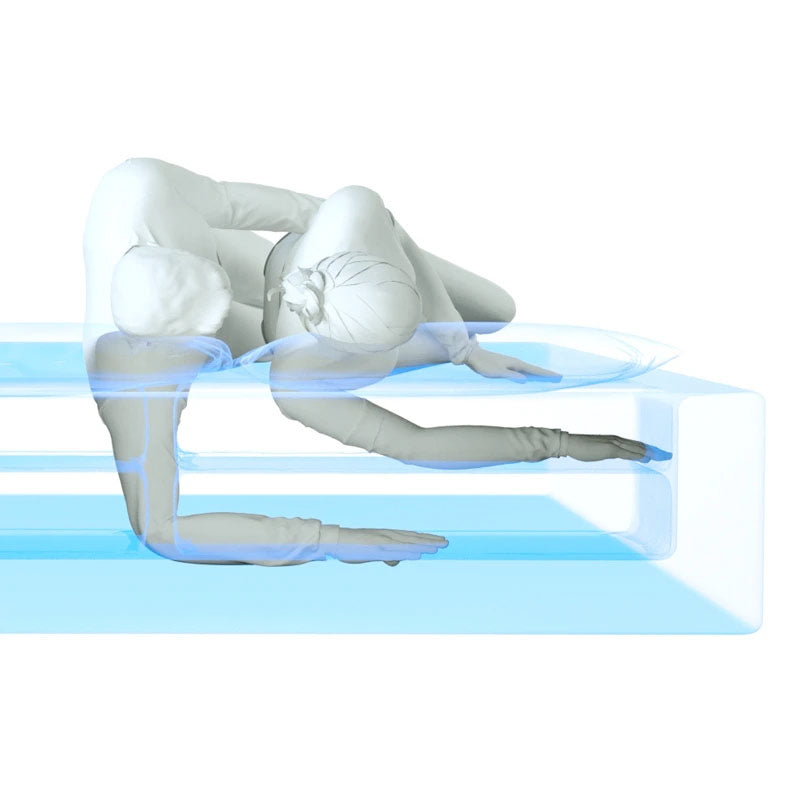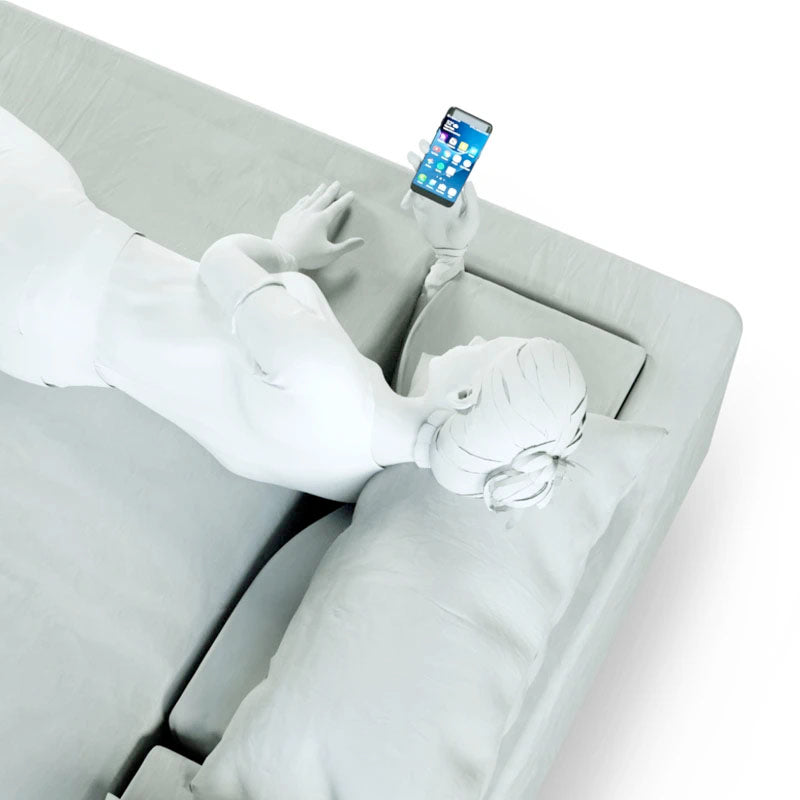Finding the right pillow is a huge part of getting some good sleep. For some people, no matter how many pillows they try, they always seem to wake up with headaches.
Up to 80 percent of North Americans have headaches, and 50 percent of those have one headache every month.
Headaches occur more often in younger people and tend to decline as we age. Not every headache is a cause for concern, but some headaches are symptoms of underlying health issues.
If you’re someone who wakes up with headaches after sleeping on certain pillows, this article can help. Keep reading and learn about 15 reasons people can get headaches from pillows, and how SONU is revolutionizing the world of sleep.
1. Neck & Spine Misalignment
The primary cause of waking up from headaches is the misalignment of the neck and spine. Lying on pillows that are too thin or too thick tilts the head in an awkward position, affecting alignment and often leading to headaches or neck pain.
To correct this issue, purchase pillows thick enough to allow the head to lay in a neutral position.
2. Pillow Firmness
Pillows that are too hard or too soft can cause great discomfort. If a pillow is too hard, it can apply pressure to a person’s head while sleeping, which could easily result in a headache. If a pillow is too soft, a person’s head will sink at an awkward angle, which could cause pain.
Sleeping on a medium-firm pillow that supports the head and neck would be a better option. SONU mattresses come with unique support pillows made of multiple layers of resilient foam, built to support your head and neck while sleeping to prevent discomfort. For additional support, you can purchase SONU’s deluxe top pillows, which are known for their malleability.
3. Sleep Disorder
Pillows alone are not always to blame for headaches. Experiencing morning headaches is often a symptom of common sleep issues like sleep apnea and snoring.
In one study, 29% of study participants suffering from obstructive sleep apnea reported waking up with morning headaches. In a separate study, over 23% of strong snorers reported waking up with headaches.
4. Dehydration
Dehydration can lead to headaches. Not drinking enough water doesn’t just cause your head to hurt; it can make you feel tired and listless. To prevent dehydration headaches, ensure you drink the recommended amount of water daily.
5. Restless Legs Syndrome (RLS)
Your legs aren’t the only things affected by RLS. Restless legs syndrome has been linked to tension headaches and migraines due to the shared brain pathways between the brain and the extremities. It could also be due to an iron deficiency.
6. Mood Disorders
There is a connection between mood disorders and pain sensitivity. Conditions like depression and anxiety can lead to a person getting less sleep, which can result in headaches. It is important to treat the mood disorder first to reduce the likelihood of insomnia and headaches.
7. Teeth Grinding
Teeth grinding, also called bruxism, is a stress-related condition involving the grinding and clenching of the jaws at night. This persistent grinding and clenching can lead to tension headaches or migraines.
Wearing a retainer at night is a popular way to deal with bruxism. Because it can also be triggered by stress, participating in stress-relieving activities or getting professional counseling could also help.
8. Insomnia
People with insomnia are also at risk of having morning headaches. Sleep deprivation can trigger tension headaches and migraines — the less sleep someone gets, the more common these headaches become.
9. Oversleeping
Yes, it’s possible to get a headache from sleeping too much. People who oversleep are at risk for tension headaches. Sleeping too much might also cause changes to the brain’s neurotransmitters.
10. Caffeine Withdrawal
People who suddenly quit caffeine after regularly consuming it are familiar with the caffeine withdrawal headache. This headache occurs while your body is detoxing itself from caffeine.
Suddenly quitting caffeine can lead to severe headaches or migraines. It is best to taper off the stimulant, reducing the amount you drink until you reach your goal. One way to help reduce the severity of headaches experienced is to take pain medication containing a little caffeine.
11. Medication
Having headaches is a side effect of some types of medication. Withdrawal from some prescriptions can lead to headaches as well. Surprisingly, adding pain medication can actually lead to chronic headaches.
Medications that can lead to headaches include the following:
- Aspirin
- Opioids
- Acetaminophen
- Nonsteroidal anti-inflammatory drugs (NSAIDs)
- Anti-anxiety prescriptions
12. Allergies
Talk to an allergy sufferer, and they can probably confirm that they’ve experienced headaches during allergy season. People with rhinitis (hay fever) often experience headaches due to irritation of their sinuses and nasal passages.
Many allergy sufferers have chronic rhinosinusitis, which leads to sinus headaches. This happens when the nasal passages become inflamed as an allergic reaction. The best way to deal with allergies and sinusitis is to seek treatment from an allergist or ear, nose, and throat doctor.
13. Migraines
A large number of people who think they are experiencing sinusitis are having migraines. Migraines sometimes present other symptoms before they attack, such as neck stiffness, mood changes, aura, vision loss, and body weakness or numbness.
See a doctor if you experience migraines with a fever, double vision, seizure, or neck stiffness. These are usually the signs of someone having a stroke. See a doctor if a migraine occurs after a head injury.
Treatment for migraines usually starts with pain medications or preventative medications that make them less frequent.
14. Hangover
If you went out for a night of drinking, you might wake up feeling like lying on your pillow is hurting your head. More than likely, you would be experiencing a hangover.
Drinking six drinks in one evening is considered heavy drinking, and the behavior has been linked to morning headaches. Alcohol itself is a depressant. While you might seem nice and giddy when it first enters your system, eventually, you can experience a “come down” that can leave you fighting off a headache.
Drinking alcohol can also lead to dehydration, another cause of headaches.
15. The Wrong Mattress
Finding the right pillow won’t do you any good if your mattress doesn’t meet your needs. A good mattress should provide support for your upper body and hips. It should be firm enough so that when you place your pillow on top of it, you don’t experience any discomfort.
Take a good look at your mattress. Take note of how you feel when you sleep on it each night. If you’re experiencing chronic aches and pains, your mattress just might be to blame. Consider upgrading to a mattress designed to provide adequate support and comfort, like SONU’s, so you get a full night of peaceful sleep.
Conclusion
Headaches are no fun. Having a headache due to sleeping on an inadequate pillow or other underlying cause is not ideal, but there are ways you can deal with the pain.
If you are experiencing chronic headaches, make an appointment with your doctor to see if you have an underlying health problem. If you’re in great shape but wake up with aches and pains, it might be time to upgrade your bed.
SONU has created a one-of-a-kind sleep system that will caress your pain away. Check out the innovative comfort of the SONU Sleep System, and allow yourself to experience luxurious sleep that only SONU can provide.
Sources:
Pillow use: the behavior of cervical stiffness, headache and scapular/arm pain | NLM
Morning headache in habitual snorers: frequency, characteristics, predictors and impacts | NLM
Quitting Caffeine the Headache-Free Way | Cleveland Clinic
Why You Wake Up With a Headache | Sleep.org
How Much Water Should We Drink Every Day? | NutritionFacts.org
Morning Headaches: Causes and Treatments | Sleep Foundation
Headaches Connected to Allergies and Sinus Problems | AAAAI
Migraine - Symptoms and causes | Mayo Clinic






















